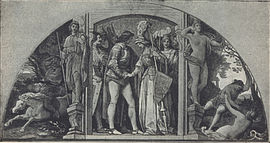The conspirators
| Work data | |
|---|---|
| Title: | The conspirators |
| Original title: |
The Conspirators The Domestic War |
| Shape: | Singspiel |
| Original language: | German |
| Music: | Franz Schubert |
| Libretto : | Ignaz Franz Castelli |
| Literary source: | Lisistrata, ou Les Athéniennes by François-Benoît Hoffman after the Lysistrata des Aristophanes |
| Premiere: | March 1, 1861 (concert), August 29, 1861 (scenic) |
| Place of premiere: | Vienna (concert), Frankfurt am Main (scenic) |
| Playing time: | approx. 75 minutes |
| Place and time of the action: | On a German castle in the Middle Ages |
| people | |
|
|
The Conspirators (original: Die Verschwornen , censorship title: The domestic war ) is a one-act singspiel with spoken dialogues by Franz Schubert ( D 787). The libretto was written by Ignaz Franz Castelli . Lisistrata, ou Les Athéniennes, Comédie en un acte et en prose, mêlée de vaudevilles by François-Benoît Hoffman ( Théâtre Feydeau , Paris 1802) based on the Lysistrata des Aristophanes (411 BC) served as a template .
Origin and premiere
It can be considered certain that the Singspiel ordered by the administration of the Vienna Court Opera was written in spring 1823; Castelli's libretto was published in print at the end of 1822. However, only vague information has been received about a performance during Schubert's lifetime, indicating a school performance with piano accompaniment. Schubert resigned himself when he learned that the composer Georg Abraham Schneider had achieved a success in Berlin at the beginning of 1824 with the setting he made at the same time.
The concert premiere took place on March 1, 1861 by the Wiener Singverein under its conductor Johann von Herbeck in the old Musikverein building in the Tuchlauben , the staged on August 29, 1861 in Frankfurt am Main . This seemed Nina Zottmayr-Hartmann and her husband Max Zottmayr with.
action
Since Heribert von Lüdenstein and his men left their castle wives alone and embarked on a crusade to the Holy Land, the women decided to refuse to show their husbands any proof of love in future. At the women's meeting under the direction of Ludmilla, however, the squire Udolin, disguised as a woman, is also present, who reveals the plans to Mr. Heribert. The men who have just returned now decide to pretend that they are no longer interested in their wives. But a young couple, very hotly in love with each other, named Helene and Astolf, refuses to be disciplined and thus breaks the front lines. Little by little women and men are reconciled again.
literature
- Fritz Racek : Franz Schubert's Singspiel “The Domestic War” and his overture that has now been found. In: Biblos. Vol. 12, 1963, pp. 136-143, ISSN 0006-2022 .
- Robert Olaf de Clercq: L'Itinéraire Vienne-Paris-Vienne d'un opéra-comique de Franz Schubert. “La Croisade des Dames”, opéra-comique en un acte. Paroles françaises de Victor Wilder. In: Cahiers F. Schubert. Volume 2, 1993, pp. 27-47, ISSN 1168-9501 .
- Till Gerrit Waidelich: The conspirators, "composed for nothing"? Ignaz Franz Castelli's libretto adaptation of the Lysistrata, set to music by Franz Schubert and Georg Abraham Schneider. In: Schubert yearbook. Bärenreiter-Verlag, Kassel 1996, pp. 41-60, ISSN 1611-6291 .
- Till Gerrit Waidelich: Escaped the Biedermeier? Arrangements and productions of Schubert's stage works. In: Elizabeth N. McKay, Nicholas Rast (ed.): Schubert through glasses. Volume 21. Tutzing 1998, pp. 26-38, ISSN 1611-6291 .
- Simone Beta: Aristofane a Vienna. Le congiurate di Franz Schubert. In: Quaderni Urbinati di Cultura Classica NS 67, No. 1, 2001, pp. 143-159, ISSN 0033-4987 .
- Till Gerrit Waidelich: "... imitée d'Aristophane". The Lisistrata by Hoffman and Solié (1802) as a link to the conspirators by Castelli and Schubert with a view of the reception of the subject in music theater. (Part 1). In: Schubert: Perspectives. 9, 2010, pp. 216-228.
Web links
- The conspirators ( memento of July 24, 2008 in the Internet Archive ) at Zazzerino
- Work data for The Conspirators based on the MGG with discography at Operone
Individual evidence
- ↑ A detail of the plot, namely as a woman disguised Udolin, participating in the Women's Assembly, is from Aristophanes' The Thesmophoriazusae inspired, but otherwise was only Lysistrata model, later wives National Assembly , however, has a very different course of action. See Piper's Encyclopedia of Musical Theater. Volume 5, p. 664.
- ↑ See Joseph Hüttenbrenner's draft of an essay with Schubert's first biographical sketch (1823) and two fragments of his unprinted Schubert obituary (1828). In: Schubert: Perspektiven 1, 2001, pp. 37–73.
- ↑ Ludwig Zottmayr at Operissimo on the basis of the Great Singer Lexicon
